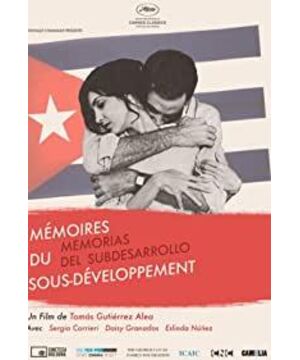The most impressive movie about Cuba is the famous dazzling work "I Am Cuba", which also has a clear political stance and ideological expression in the crazy dazzling show, just like the greatest propaganda of the proletarian revolution attitude. The film is also filled with a lot of ideological discourses and political positions. The identity and way of life of the male protagonist Sergio and post-revolution Cuba are inherently a class contradiction. In the process of watching the movie, I always think of Louis Mahler's "Ghost Fire" from time to time. It is also narrated with the inner and outer actions of a middle-aged man as the absolute driving force, and they all seem to be outside the surroundings. There are a lot of inner dictation parts in the film, in the tone of an intellectual, he tells his own past, the social environment at the moment, his inner feelings and his judgment of the surrounding. During the period, a large number of real pictures and freeze-frame images are inserted, and the fast editing pictures continue to oppress the audience's vision. It also shows the contemptuous attitude of Sergio's dictation, which is exclusive to the narcissistic contempt of middle-class intellectuals. He broke into a brothel at the age of 13, and then visited the brothel every week. He is now 38 years old and relies on rent to support his living expenses. Writing is his profession, but he also fantasizes about falling in love with his domestic maid while writing. . The first third of the film unfolds in this stream-of-consciousness self-report, until he meets Elena, a young and beautiful 17-year-old Cuban girl. This playful and slightly mysterious girl had a wonderful time with Sergio, but finally came to the door with her family and asked Sergio to marry Irina, because Sergio broke the Lena's virginity, but Sergio emphasized that Elena is not a virgin at all... Such a plot similar to threats, intimidation and "corruption" is not uncommon in a backward country or region, plus Serge Gio's middle-class identity has obvious ideological appeals. Sergio's wife and parents left Cuba during the revolution, and he is the only one left here, which seems to have an intellectual experience and a "sacrifice", but he is always in a state of dissociation, like a whole The temperament of the film is the same. He holds the binoculars and looks at the entire city and street buildings, like an absent present, but even in dissociation and alienation, he also has a class existence. In the second half of the film, there is a passage of a political seminar. In this passage, the speaker and the questioner discuss and "brainwash" ideological issues such as the bourgeoisie and the proletariat. Sergio is still "out of the picture", but there is no political issue. Everywhere, including Sergio himself, is part of politics and ideology.
View more about Memories of Underdevelopment reviews








